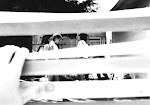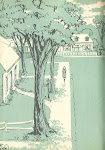Tuesday, March 29, 2011
Diana Wynne Jones 1934-2011
What I loved about Diana Wynne Jones' books was their sheer inventiveness. She had a way of looking at the world that no one else had, and way of imagining magic that owed nothing to anyone who came before her. Magic overlaid and intertwined with the real world in her novels, but they were also grounded in real emotional situations -- the feuding parents of The Lives of Christopher Chant and Aunt Maria, school rivalries in Witch Week. Above all she could take an abstract concept -- time, for instance, or mythology -- and make it a real-world object without ever seeming gimmicky or heavy-handed.
My favorite Diana Wynne Jones novel is The Time of the Ghost, which is also one of her earliest. It begins with a ghost who is unsure who she is or what happened to her. Observing her sisters and family, she begins to piece the story together, until about half-way through the book, when the narrative jumps forward in time and the reader realizes that nothing is what it appears to be. The sisters in the book, and their situation -- living in a boys' school, neglected by their parents -- were based on Jones' own childhood, which adds to the darkness of a book that is already concerned with death and witchcraft. Jones would go on, in her prime, to write books that were much more inventive than The Time of the Ghost. But I've rarely read a YA book with such emotional depth. If you've never read Diana Wynne Jones, go look for the The Time of the Ghost. Then read Dogsbody, and then the Chrestomanci books, starting with The Lives of Christopher Chant. And then you should still have a couple dozen more books to read. You'll enjoy every one of them.
Tuesday, March 22, 2011
Turtles All the Way Down
Don't know the "turtles all the way down" story? Here is is:
Bertrand Russell (or some other agnostic scientist, in other versions of the story) is giving a lecture on the universe. Afterwards an old lady comes up to him and says:
"Very interesting lecture, young man, but you're completely wrong. The universe sits on the back of a giant turtle."
Russell says: "All right, but what does the giant turtle sit on?"
Lady: "Another turtle."
Russell: "And what does that turtle sit on?"
Lady: "Another turtle."
Russell: "And what does that turtle sit on?"
Lady: "You're not listening, young man. I'm telling you, it's turtles all the way down!"
Revising this is like pushing one of those turtles out of line. And it's a long, long fall to the bottom of the universe.
Yes, I know this is the "kill your darlings" rule. Any advice on "giving-your-darling-a-haircut-but-not-chopping-off-its-head?"
Monday, March 21, 2011
News from 1964
Oh, sure, we have a lot of lore: Busgy Siegel...Benny Binion...Howard Hughes. But uncovering ordinary life in Las Vegas is hard. For instance, the microfilms of Las Vegas' two newspapers are kept at UNLV. But they're not indexed. Actually, they are partly indexed, but those partial indexes are kept in a different location, across town. So when I do get down to UNLV to do look at those microfilms, I'm just going to have to fish around.
Until I can get to UNLV, however, I've been relying on the Henderson Home News. Henderson, the suburb where I now live, was in those days a small industrial town way some ways out in the desert from Las Vegas. The Henderson library has digitized every issue since 1950 and put it online. Keep in mind that Henderson was a small, small town in those days. The Home News came out two days a week and ran about 4-6 pages, plus advertising. Sample front page articles: someone found a lost dog out in the desert. Two rattlesnakes are killed on Texas Street. A square dance is held to raise money for a local family with a sick child.
But as I read a little more, I began to see the Henderson, for all its sleepiness, had some major stuff going on. Perhaps not surprisingly for a small town dominated by industry, there was some political corruption. The Home News ran a number of headlines critical of the mayor, a man named William Byrne. In January of 1964 they criticized him for keeping Henderson out of the state health district. By March, they were able to show that he had enriched himself in a local land deal. In April they began a recall drive. By August (I skipped ahead), there was a new "mayor pro tem," which suggests that Byrne resigned. In February an Esquire magazine writer named Thomas K. Wolfe accuses the Henderson hospital, St. Rose of Lima, of catering to Vegas call girls, an allegation loudly denounced by all. (Seems unlikely to me...the hospital was still run by nuns in those days.) In late January, Mrs. Maralyn Warmington goes on trial for shooting her husband, who had threatened to kill her if she left the house to go to a ceramics class. Mrs. Warmington is acquitted a week later, after the police mishandle the evidence in the case. (On purpose, I wonder?) In September of 1963 John F. Kennedy visits Henderson and makes a speech at the Convention Center. Two months later the newspaper comments on his death are shocked and heartfelt.
I also begin to see, a little bit, the town I know. One of the Home News reporters, Jim Gibson, was mayor when I moved here, and then ran for governor. His father, Fred Gibson, was one of Henderson's first residents, and every day I drive to work on a road named after him. Then there's this article from 1963, a few weeks before Kennedy's assassination: "Basic High Graduate Harry Reid Passes Bar Exam."
(For my non-American followers, Harry Reid is now the Majority Leader of the US Senate.)
Of course, I'm writing my WIP about Las Vegas, not Henderson. But I think a lot of the stuff in the Home News will still be useful. The paper ran a lot of advertising, which is great for getting a handle on prices of things. There are bits of local color: rockets trails from the Nevada Test Site seen in in the sky at sunset. High school basketball standings. A "teen-age rumble" which resulted in a locker search at the high school, which resulted in a bottle of gin being found in a girl's locker.
No word on what happened to the girl, or the gin.
Friday, March 11, 2011
Library Thing
Unlike Shelfari or Goodreads, Library Thing is more focused on books you own (though you can make a category for books you've read but don't own.) And a library -- the books you've collected over a lifetime -- gives a slightly different picture of who you are as a reader. I have books in my library that belonged to my parents. I have favorite authors from my high school days. I have cheap paperbacks from book swaps. I have textbooks, home-repair manuals, cookbooks, and a guide to the major festivals of Japan.
A library, like a diary, is only a partial reflection of who you are. A lot of my recent interests aren't represented because I don't buy as many books as I used to for lack of space. But I'm looking forward to using Library Thing more than I used Shelfari, and getting to know the community there.







